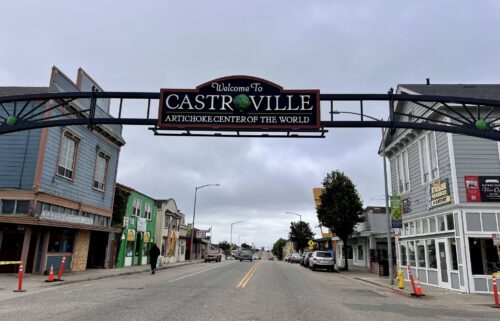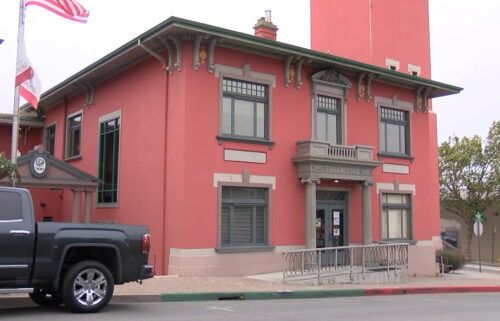‘A very significant emergency’: California’s deadly, record-setting storms are about to get an encore
By Nouran Salahieh, Holly Yan and Monica Garrett, CNN
The historic storms devastating much of California have turned entire neighborhoods into lakes, unleashed sewage into floodwater and killed at least 18 people.
And there’s more to come. About 5 million people were under flood watches Wednesday as yet another atmospheric river is bringing more rain to California.
“The state has been experiencing drought for the last four years, and now we have storm upon storm,” California Lt. Gov. Eleni Kounalakis said Wednesday.
“We’ve had six storms in the last two weeks. This is the kind of weather you would get in a year and we compressed it just into two weeks.”
It had already been “one of the deadliest disasters in the history of our state,” Brian Ferguson, California Governor’s Office of Emergency Services spokesman said Wednesday before the 18th death was reported.
“Yesterday, we had perhaps more air rescues than we’ve ever had on any other single day in the state’s history,” Ferguson said, adding that the Golden State is not out of the woods yet.
“While there is a bit of a break today, we continue to see additional storms prepared to come onshore in the next two days,” he said. “We’re continued to be concerned about our streams, our culverts and some of the areas that are prone to mudslides, particularly along our central coast.”
The flood watches Wednesday are primarily in Northern and Central California, including Sacramento, the North Bay and Redding. That barely leaves enough time for residents in flood-ravaged neighborhoods to assess the devastation before the next storm.
“It’s just brown water everywhere. And it’s just rushing through — it was going fast,” Fenton Grove resident Caitlin Clancy said.
“We had a canoe strapped up, that we thought if we needed to, we could canoe out. But it was moving too fast.”
The onslaught of recent storms came from a parade of atmospheric rivers — long, narrow regions in the atmosphere that can carry moisture thousands of miles.
“We have had five atmospheric rivers come into California over two weeks,” Kounalakis said.
“Everything is wet. Everything is saturated. Everything is at a breaking point, and there is more rain coming.”
In fact, four more atmospheric rivers are expected to hit California in the next 10 days.
What to expect with this next wave
Here’s what’s in store as another round of ferocious weather barrels down on the West Coast:
• The heaviest rain over the next seven days is expected in northern parts of California, where the National Weather Service predicts an additional 5 to 10 inches. On Wednesday, Northern California got a radar-estimated 1-2 inches of rain, with some higher elevations getting around 3 inches.
• The rain shifted north Wednesday afternoon, giving Central California a brief pause. There’s a slight risk — level 2 of 4 — for excessive rainfall Thursday for the northwest coast, and a marginal risk — level 1 of 4 — along the Pacific Northwest coast.
• Precipitation pushed inland to the Sierra Nevada Wednesday afternoon, dumping more snow. Snow was still falling Wednesday evening.
Another round of atmospheric moisture is expected to come onshore Friday, but less severe than earlier ones. A slight risk for excessive rainfall has been issued for the northwest coast of the state, with a marginal risk south, including the hard-hit Bay Area and San Luis Obispo.
A 5-year-old boy swept away is still missing
Rescue crews in San Luis Obispo County are scrambling to find 5-year-old Kyle Doan, who was swept away from a truck near the Salinas River Monday morning.
National Guard members arrived Wednesday to help with the search, and more will be arriving Thursday, the San Luis Obispo County Sheriff’s Office said in a tweet Wednesday.
The sheriff’s office earlier urged the public to leave the search operation to the professionals to avoid the risk of volunteers needing to be rescued themselves.
‘It’s backbreaking labor’
As another storm looms, many residents are still grappling with devastation to their communities.
Rachel Oliviera used a shovel to try to push out some of the floodwater and thick mud enveloping her Felton Grove home.
“It’s backbreaking labor,” Oliviera said, visibly emotional.
But she was more concerned about her neighbors, whose homes were also covered in thick mud.
“A lot of us that live here in the neighborhood are elderly, and can’t actually physically do the cleanup.”
Smashed cars, destroyed homes and gushing sewage
In the Los Angeles neighborhood of Chatsworth, several people had to be rescued after a sinkhole swallowed two vehicles Tuesday. In Malibu, a massive boulder came crashing down, shutting down a key roadway.
In parts of Santa Barbara County, “the storm caused flows through the sewer system to exceed capacity, resulting in the release of sewage from the system to the street,” County Supervising Environmental Health Specialist Jason Johnston said Monday evening.
The local health department warned the water could increase the risk of illnesses.
Another sinkhole was reported Monday in Santa Barbara County’s Santa Maria, where 20 homes were evacuated, CNN affiliate KEYT reported.
“The storms hit us like a water balloon exploding and just dropped water down through our rivers and creeks. So it’s been this excessive amount of flooding — it’s been the cycles over and over again,” Santa Cruz County spokesman Jason Hoppin told CNN.
Hoppin said 131 homes in the county received significant damage, but could be salvaged, while five others are not salvageable.
Trees have been toppling, claiming lives and causing property destruction and roadway obstructions. Sacramento officials estimate that about 1,000 trees have fallen since New Year’s Eve, Sacramento Department of Public Works spokeswoman Gabby Miller told CNN on Wednesday, adding that staff and crews have been working around the clock on cleanup.
In San Francisco, the public works department has logged about 1,300 tree-related incidents, which include downed trees, but also just limbs and branches, according to Rachel Gordon, director of policy and communications at San Francisco Public Works.
Parks that are home to some of the state’s iconic redwoods haven’t been spared, according to California State Parks spokesperson Adeline Yee.
“At Redwood National and State Parks and Big Basin Redwood State Park, we’ve seen some downed trees that are blocking roads and trails,” Yee said. “At this time, most of the trees that have come down are not the old-growth redwoods.”
In the state park system, 54 park units were closed as of Wednesday morning, and 38 were partially closed.
The recent atmospheric river storm system also has left dozens of state travel routes inoperable, and at least 40 are closed, according to Caltrans spokesman Will Arnold.
“Caltrans has activated our 12 Emergency Operations Centers throughout the state and more than 4,000 crews are running 24/7 maintenance patrols for road hazards like downed trees, flooded roads, mudslides/rockslides,” Arnold said.
The storms have claimed 18 lives
The recent storms turned fatal after trees crashed onto homes and cars, rocks and mud cascaded down hillsides and floodwater rapidly rose.
At least 18 people have died in California storms in just the past two weeks. The latest victim was a 43-year-old woman, whose body was recovered Wednesday from inside a vehicle that had been washed into a flooded Sonoma County vineyard, officials said. Divers found the vehicle submergd in 8 to 10 feet of water.
“That’s more than we’ve lost in the last two years of wildfires,” the lieutenant governor said. “So this is a very significant emergency.”
Rebekah Rohde, 40, and Steven Sorensen, 61, were both found “with trees on top of their tents” over the weekend, the Sacramento County Coroner said. Both were unhoused, according to the release.
In the San Joaquin Valley, a tree fell on a pickup truck on State Route 99 in Visalia on Tuesday, killing the driver. A motorcyclist also died after crashing into the tree, the California Highway Patrol said.
Another driver died after entering a flooded roadway in Avila Beach Monday, the San Luis Obispo County Sheriff’s Office said.
“It only takes six inches of water to lose control of a car to be knocked over. In 12 inches, cars start floating away,” Kounalakis said this week.
“You’ve heard that creeks that have risen 14 feet just in the last day and in certain areas we’ve had over a foot of rain — just in the last 48 hours. So it is unbelievable.”
Extreme weather and the climate crisis
Several areas across the state have registered 50% to 70% of their average annual rainfall just since the parade of atmospheric river events began to impact the state on December 26, according to the National Weather Service. Oakland got 69% of its annual average, Santa Barbara 64%, Stockton 60%, and downtown San Francisco 59%.
Downtown San Francisco, Oakland and Santa Barbara have each gotten more than a foot of rain, according to the NWS.
Though none of the coming storms are expected to individually be as impactful as the most recent ones, the cumulative effect could be significant in a state where much of the soil is already too saturated to absorb any more rain.
And the state’s ongoing drought has parched the landscape so much, the soil struggles to absorb the incoming rainfall — which can lead to dangerous flash flooding.
Scientists have warned the climate crisis is having a significant effect on California’s weather, increasing the swings between extreme drought and extreme rain.
The-CNN-Wire
™ & © 2023 Cable News Network, Inc., a Warner Bros. Discovery Company. All rights reserved.
CNN’s Camila Bernal, Stella Chan, Joe Sutton, Angela Fritz, Derrick Hinds, Taylor Ward, Robert Shackelford and Cheri Mossburg contributed to this report.


